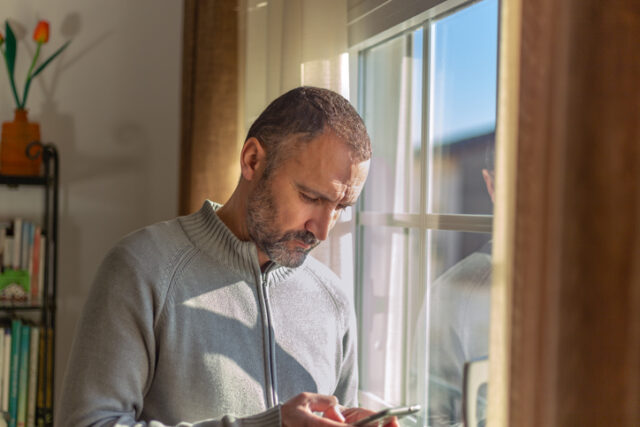Letting people help you sounds simple enough, but it’s not always easy to let someone else step in and lighten your load.

Most of the time, realising you can’t go it alone anymore comes on slowly. You feel a little tired, a little overwhelmed, and you start to wonder if maybe you don’t have to keep doing absolutely everything by yourself. You’re not waving a white flag or anything, but you are starting to question whether carrying the entire load solo is really working anymore. Here’s how you know you’re finally ready to accept a bit of help.
1. You’ve been wanting company, even if you don’t want to talk.

You’re not looking for a deep heart-to-heart. You just want someone to be there. Maybe sitting nearby while you cook, or watching a show with you in silence. It’s not because you need advice—just because it feels a little lighter with someone else around. That urge for company says a lot. Even if you’re not ready to spill your guts, your body’s hinting that it wants a break from doing life totally alone. That’s a start.
2. Being “the strong one” is starting to feel heavy.

You’ve worn that badge forever. People come to you, you hold it all together, and no one ever really checks how you’re doing. But lately, that strength is starting to feel more like a burden than a flex. You’re not giving up; you’re realising that maybe you don’t need to carry everyone else’s stuff and your own 24/7. Letting someone lighten the load a bit doesn’t mean you’re falling apart. It just means you’re done pretending it’s not exhausting.
3. You’ve started picturing what it’d feel like if someone just showed up for you.

It doesn’t happen in a dramatic way. Just someone bringing over dinner without asking, or folding your laundry while chatting. The kind of support that doesn’t make a big deal out of it, but still feels warm and solid. When you start imagining little things like that, it usually means a part of you wants them, even if you’re still unsure how to let it happen. That’s not weakness. That’s you getting honest about what you actually need.
4. You’re noticing who makes you feel safe, not drained.

There are people who ask how you’re doing and actually mean it, who don’t push when you’re quiet, and who stick around without needing constant updates. You’re starting to notice how different that feels compared to people who expect something from you. That awareness is big. It means your gut’s starting to separate real support from fake concern, and when you can tell the difference, it gets way easier to let the right people in.
5. You’re not trying to prove anything anymore.

You’ve done the “look how capable I am” thing. Maybe it got you respect. Maybe it just got you really tired. Either way, you’re done needing to prove you can do it all alone. You’re not trying to win a medal for toughest person alive. You just want a life that doesn’t feel like a constant endurance test, and part of that might mean letting someone show up when it counts.
6. You’ve started saying “I don’t know,” and actually meaning it.

It’s not said in a defeated way, just in a real one. You’re okay admitting when you don’t have the answers. You’re not pretending to be fine when you’re not. And weirdly, that feels kind of… relieving? That honesty is a crack in the old walls. If you can say “I don’t know,” you’re already halfway to saying “I might need a hand.” The rest will come.
7. Help doesn’t feel like a debt anymore.

You used to think that if someone helped you, you owed them. Like you had to match it or make up for it. Now, however, that mindset’s wearing off. You’re starting to see that real support isn’t about keeping score. You’re not a burden just because someone cares. That idea’s sinking in—slowly, sure, but it’s there. That makes all the difference when it comes to letting someone show up without flinching.
8. You’re noticing how good it feels to help other people without needing anything back.

When someone you care about is struggling, you don’t sit there thinking about how they’ll pay you back. You help because you want to, and it feels natural. Easy. Worth it. So what if someone wants to do the same for you? What if they’re not secretly annoyed or waiting for the favour to be returned? The more you realise you don’t keep score, the easier it gets to believe other people won’t either.
9. You’re not shutting people down as fast when they offer.

You used to say “I’m fine” before they even finished the sentence. Now, even if the answer is still technically no, you pause. You hesitate. You think, “Should I say yes?” And sometimes… you almost do. That little pause means your reflex to reject help isn’t running the show anymore. Something inside you is curious about what would happen if you accepted. That’s progress, whether you act on it yet or not.
10. You don’t see needing help as a personal failure anymore.

You used to treat help like a sign that something had gone wrong. That you weren’t coping. That you’d slipped. But now, you’re seeing it differently. Like maybe help is just part of being human, not a red flag that you’re falling apart. That change might not make it feel *easy*, but it definitely makes it feel less shameful. And that alone is enough to make asking—or even accepting—feel more possible.
11. You’re okay being seen, even when you’re not “on.”

You’re not hiding your bad days as hard. If someone stops by, and you’re a mess, you don’t panic-clean or fake a smile. You just let it be. You let you be. That kind of ease is rare, and it’s often a sign that you’re getting more comfortable being witnessed without performance. Which is exactly the kind of space where real support happens.
12. You’re tired of muscling through everything.

You’ve handled a lot on your own. You know how to push through, hold the pieces, get things done. But it’s starting to feel like survival mode just won’t cut it anymore. You’re ready for something gentler. That change doesn’t come with fireworks. It usually shows up as quiet exhaustion and a craving for softness. That craving means you’re ready for help that doesn’t feel like rescue—just relief.
13. You’re starting to trust that some people actually mean it when they say “I’m here.”

You used to roll your eyes or brush it off. “They don’t really mean it.” “They’re just being polite.” But now, part of you is starting to believe that maybe they do. Maybe you could call. Maybe they’d actually show up. That tiny bit of belief matters. It means your trust muscle is waking up again. And once that happens, letting people help becomes way less scary—even if it still feels weird sometimes.




